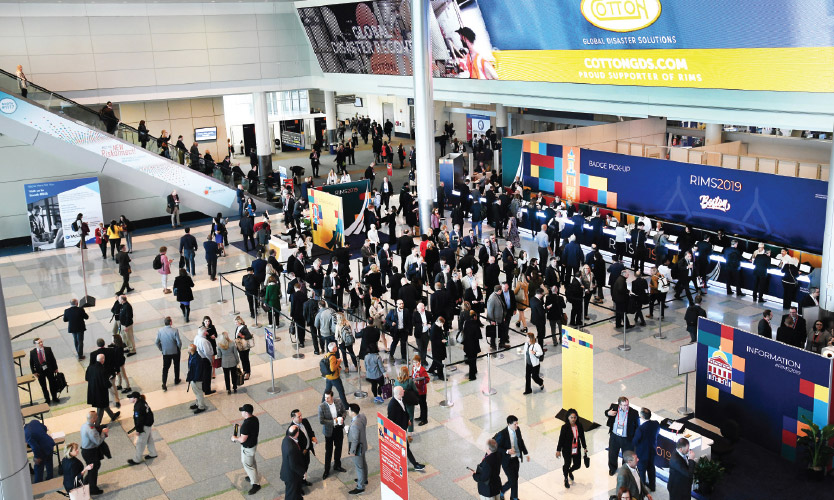Events sector tries unconventional approach in COVID-19 era
- July 1, 2024
- Posted by: Web workers
- Category: Workers Comp

The convention industry went from robust to bust virtually overnight when the COVID-19 pandemic shut down the U.S. in March. While the industry has successfully pivoted to virtual events, there is optimism that in-person events will resume next year, even if they look very different from conferences and trade shows past, experts say.
“The pandemic has undoubtedly devastated the events industry right now,” said Stuart Ruff-Lyon, 2020 chairman of the board of Chicago-based Professional Convention Management Association and vice president of events and exhibitions for the Risk and Insurance Management Society Inc. in New York. “While we try to safely return to face-to-face events, we’re looking at every aspect: how can we do this differently? How can we best manage under the new reality we’re currently experiencing? Have all risks about possible exposure been mitigated?”
RIMS, which canceled its 2020 annual conference scheduled for Denver, is planning a hybrid event — part live in Chicago, part virtual — for the 2021 conference.
In the first quarter of 2020, the most recent data available from database firm Statista, revenue in the exhibition industry saw its greatest decline ever of 15%.
In late February, when it was evident that COVID-19 was here to stay, the convention department at MGM Resorts International began immediately putting protocols in place to prevent the spread of COVID-19 — mainly focusing on food and beverage service — even though no one was certain how the virus was spread, said Stephanie Glanzer, MGM’s chief sales officer, based in Las Vegas.
Over the past seven months, MGM has created a detailed safety protocol for how clients can safely convene, and the casino has begun hosting some small groups, she said. The plan is continuously being updated to reflect the constantly shifting federal, state and local requirements, she added.
Questions remain over what exactly a convention venue will look like in the future, said Carolyn Richmond, New York-based chair of the hospitality practice group at Fox Rothschild LLP. Some of the likely changes include the elimination of buffets and long lines, improved heating, ventilation and air conditioning systems, increased cleaning crews, required health declarations for attendees and personal information for contact tracing purposes, and expanded safety departments to ensure that health and safety protocols are followed, she said.
“Most of the attention is being spent on proving to the potential customer that the venue has everything organized,” such as eliminating wait-in-line registration, checking temperatures, setting up rooms appropriately for social distancing, and limiting the number of people who can participate in a panel discussion, Ms. Richmond said.
In October, MGM began offering rapid COVID-19 testing and screening to its conference packages, providing opportunities to screen and test each attendee and provide a health pass to all those who tested negative, Ms. Glanzer said. The attendees could also be contained in a “bubble” of guest rooms, meeting spaces and entertainment zones to minimize exposure risks, she said.
In mid-September, the Alabama Captive Insurance Association held its annual conference in person in Birmingham, Alabama with about 150 total attendees over the two-day period and a litany of COVID-19 protection protocols in place.
The association selected a much larger venue than it normally would have needed to allow for social distancing and planned its social events at outdoor venues, said Justin Law, the Montgomery, Alabama-association’s managing director of student initiatives. Vendors sponsored branded hand sanitizer and face masks, and the association also created a wrist-band program, letting attendees choose between red, meaning they were very COVID-
conscious, or yellow, meaning they might be open to an elbow bump, he said.
The association also made sure to negotiate a flexible cancellation policy with the facility to allow the group to cancel if federal, state or local policies changed, jeopardizing the event, he said. More than a month after the event, no attendees had reported a positive COVID-19 test to the association.
Despite the protocols and changes, a big question for many organizers is the liability they can face if a conference-goer contracts COVID-19 at an event, said Greg Stevning, Indianapolis-based vice president in Marsh LLC’s U.S. entertainment and media industry practice.
“The other issue is corporate travel,” he said. “A lot of corporations have put bans on traveling, so even if they have these events, is anybody going to come?”
While the legal issues surrounding in-person events “seem to change almost daily or weekly depending on the jurisdiction,” Ms. Richmond is hopeful for the future of the conference industry.
“This is a big challenge, but hotels, convention halls and caterers, they’re all looking at new ways to do things,” Ms. Richmond said. “These people are in the business of hospitality and they will adapt.”



